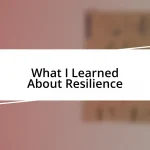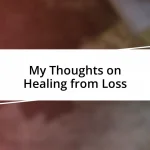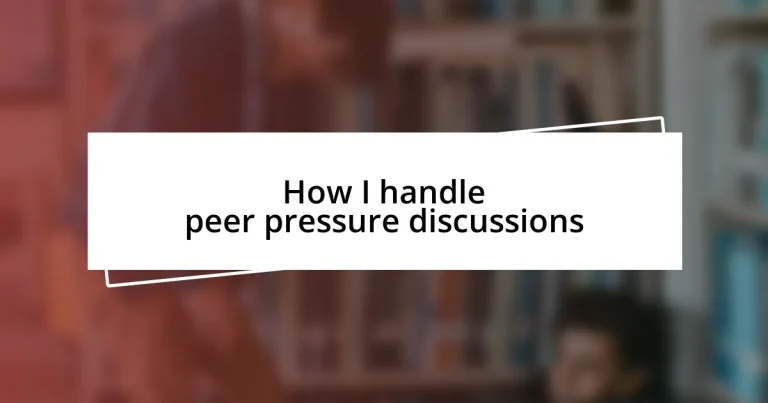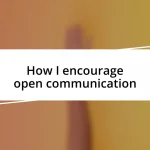Key takeaways:
- Peer pressure arises from both friends and societal expectations, influencing personal values and choices.
- Recognizing cues of peer pressure, such as changes in behavior and emotional discomfort, is crucial for making authentic decisions.
- Building self-awareness through introspection, like journaling, strengthens resilience against peer pressure and enhances confidence.
- Supporting peers through open communication and shared experiences fosters a positive environment that mitigates negative peer influence.
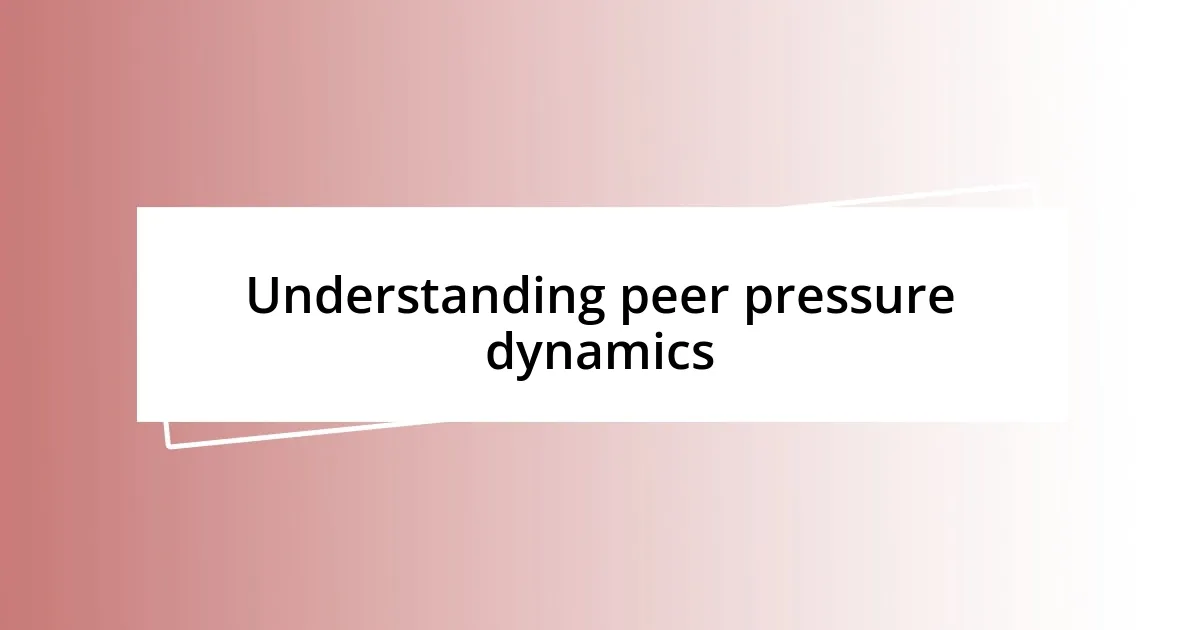
Understanding peer pressure dynamics
Peer pressure is a complex interplay between social influence and individual choice. I remember a time in high school when a close group of friends wanted to skip classes, and I felt that pull to join them. It’s fascinating how the desire to fit in can sometimes overshadow our better judgment, isn’t it?
Reflecting on those moments, I realized that peer pressure doesn’t just stem from friends; it also arises from societal expectations. There were times I felt pressure to adopt certain trends or behaviors just to be accepted. Have you ever felt that tug from a trend you weren’t truly interested in? Those feelings reveal how deeply intertwined our behaviors can be with the groups we associate with, often blurring the lines between personal values and collective norms.
Understanding the dynamics of peer pressure involves recognizing both its positive and negative aspects. While it can push us towards unhealthy choices, it also has the potential to motivate us to strive for excellence. For instance, I once joined a study group that, at first, felt intimidating. Yet, they encouraged me to enhance my study habits, turning that peer influence into something positive. Isn’t it interesting how peer dynamics can shape our choices in unexpected ways?
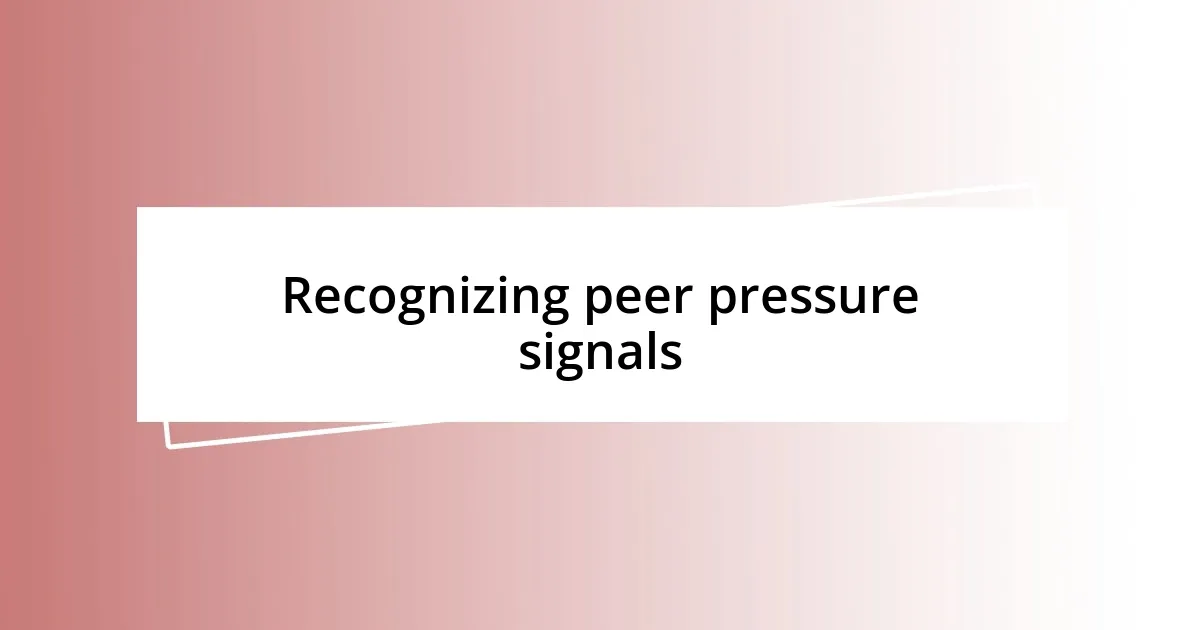
Recognizing peer pressure signals
Recognizing peer pressure signals can be quite revealing. Often, it starts with subtle cues—a friend’s tone of voice or an offhand comment about a new trend. These signals can easily slip under the radar, but when I look back on past experiences, I notice moments when I felt uneasy, like when my friends made jokes about someone not participating in an activity. It was clear then that there was an expectation to conform, even if it wasn’t explicitly stated.
Here are some signals to watch for:
- Changes in behavior: When friends suddenly start acting differently around you, it may indicate pressure to conform.
- Emotional cues: Pay attention to feelings of discomfort, guilt, or anxiety that arise when certain topics come up.
- Group dynamics: Notice if decisions or discussions seem dominated by a few individuals, often pushing others to follow along.
- Verbal pressure: Listen for phrases like “everybody’s doing it” or “you’ll be left out” that can provoke feelings of obligation.
Each of these signals serves as a reminder of how easy it is to get swept away in the tide of social expectations. For me, realizing the significance of these cues was a step towards making choices that truly reflect who I am, rather than what others want me to be.
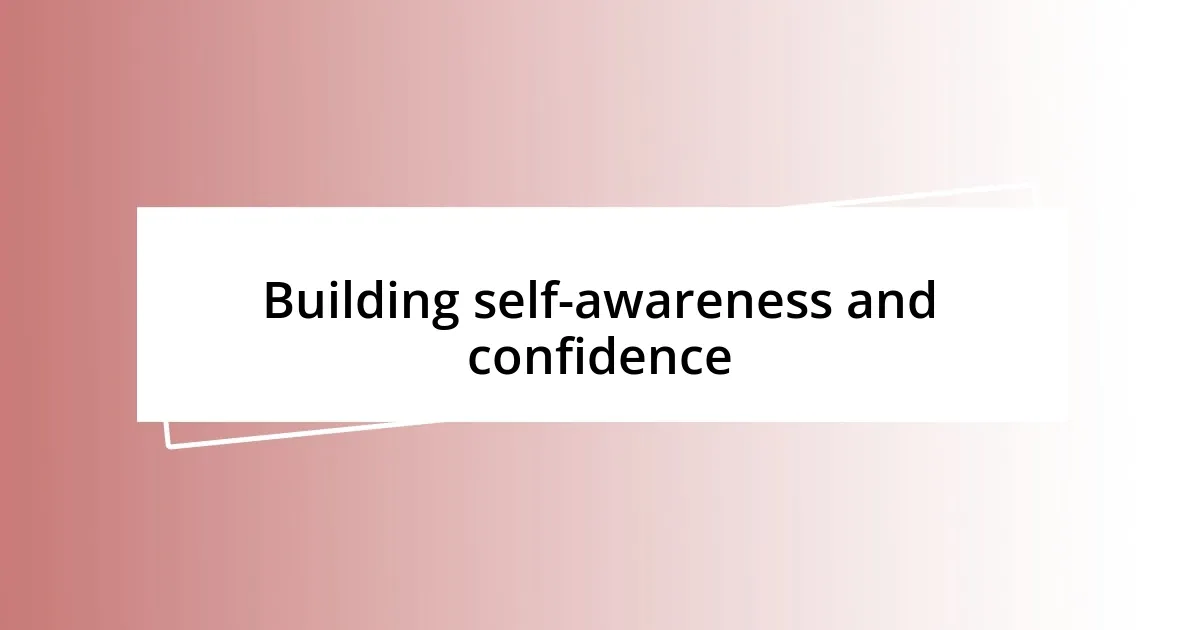
Building self-awareness and confidence
Building self-awareness and confidence is a journey that requires introspection and a commitment to personal growth. I often find myself asking, “What do I really want?” This question can seem daunting but delving into my true feelings has led me to understand my values better and, consequently, become more confident in my decisions. For example, I remember a time when I felt pressure from my friends to go out drinking, but it was through understanding my personal health goals that I confidently chose to stay in and focus on my well-being instead.
Developing self-awareness is about tuning into your inner voice. The practice of journaling has been a game changer for me. It allows me to reflect on my experiences and the emotions behind them. When I write down my thoughts, I often uncover patterns that reveal what truly matters to me. This act of self-reflection enhances my confidence because it reinforces my sense of identity, making it easier to resist peer pressure.
In terms of confidence, I’ve learned that practice makes progress. Each time I chose to act in alignment with my values, I felt a little stronger. It’s like building muscle; at first, the weight seems overwhelming, but as I lift it repeatedly, I grow more adept. Have you ever felt that same sense of growth? It’s empowering to see the person I’ve become through these choices, continually nurturing my self-awareness and confidence as vital tools in navigating peer pressure.
| Self-Awareness | Confidence |
|---|---|
| Understanding personal values | Building resilience against peer pressure |
| Reflective practices (like journaling) | Taking consistent action towards personal choices |
| Recognizing emotional triggers | Speaking up against conformity |
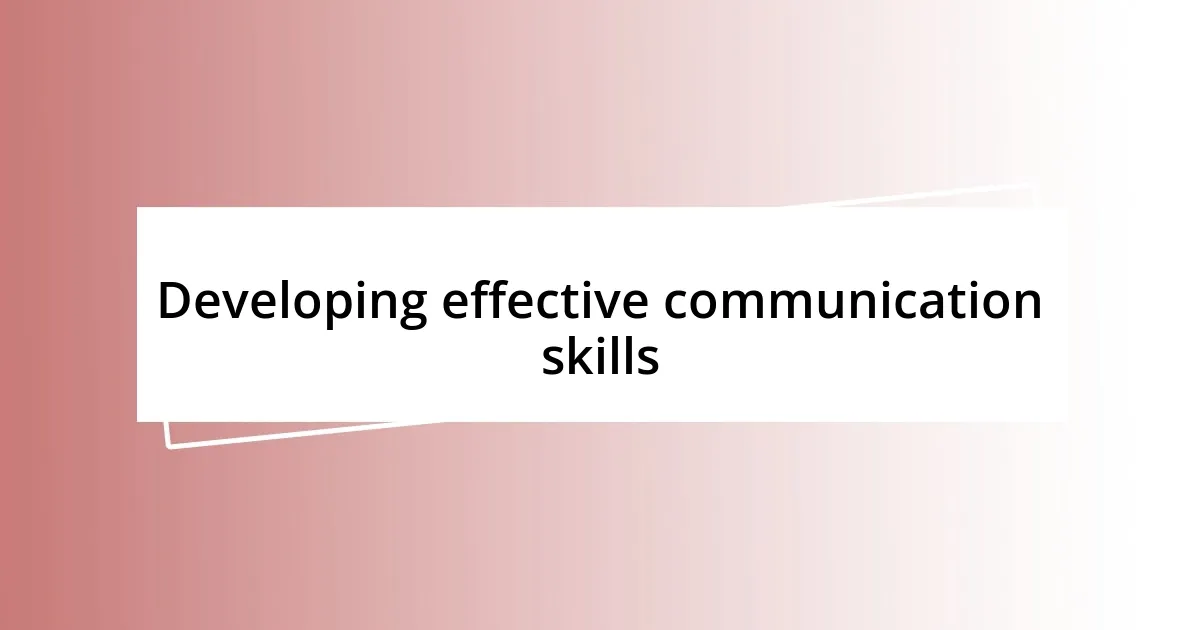
Developing effective communication skills
Developing effective communication skills is essential in navigating peer pressure. I remember a situation where a friend urged me to join in on something I wasn’t comfortable with. I took a deep breath and calmly shared my feelings, saying, “I appreciate the invite, but that’s not for me.” It was powerful for me to express my thoughts clearly, and I felt a rush of relief afterward, reinforcing the value of honest dialogue.
Active listening plays a huge role in communication, especially when discussing peer pressure. One day, a friend opened up about feeling excluded, and instead of jumping in with advice, I chose to listen. By giving them space to share, I realized that communication isn’t just about speaking; it’s also about being attuned to others’ emotions. This exchange deepened our friendship and helped me recognize the importance of empathy and understanding in conversations.
Moreover, nonverbal cues can convey just as much as words. I often reflect on how posture and eye contact can shift a discussion’s direction. I remember sitting with a group of friends when I noticed someone looking down, signaling their discomfort with the topic at hand. By gently shifting the conversation, I felt empowered to create a more inclusive and supportive environment. Isn’t it enlightening how our body language can speak volumes? Being mindful of these cues not only enhances our communication skills but also fosters stronger connections with those around us.
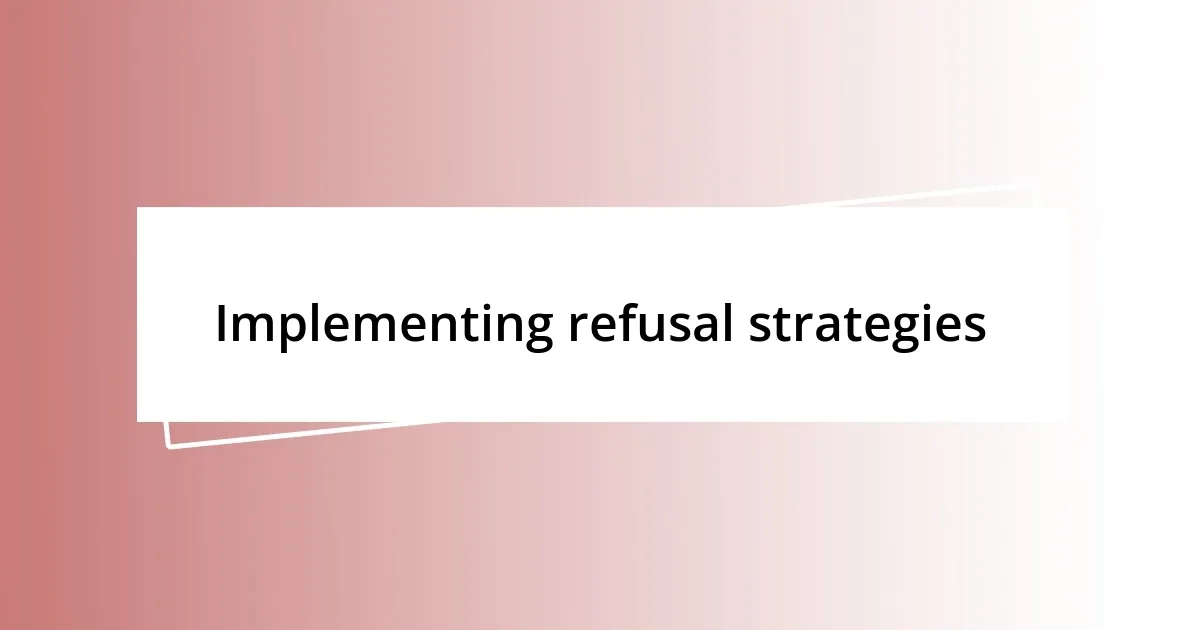
Implementing refusal strategies
When it comes to implementing refusal strategies, I’ve found that clarity is crucial. There was a time when a group of friends invited me to a party where I knew there’d be drugs. Instead of just flat-out saying “no,” I opted for a more positive approach, telling them, “I have plans that night.” This little twist turned potential tension into a simple scheduling conflict, and it made it easier for everyone to move on. Have you ever realized that by framing your refusal in a way that doesn’t put others on the defensive, you can maintain your relationships while staying true to yourself?
Another tactic I’ve discovered is the power of having pre-prepared statements. A few weeks ago, a classmate insisted I join a project that conflicted with my priorities. I had a simple line ready: “Thanks for considering me, but I need to focus on my current commitments.” It felt empowering to have that reliable response ready. I encourage you to think about phrases that resonate with your beliefs and values; having those on hand can make saying no feel less intimidating.
Lastly, I’ve practiced the art of suggesting alternatives. The other day, when friends wanted to hit a bar, I said, “How about a movie night instead?” This not only redirected the conversation but also allowed us to spend time together in a way that aligned with my comfort level. Isn’t it fascinating how a little creativity can transform a situation from pressure to possibility? Finding alternatives not only helps you refuse but also opens up new avenues for connection.
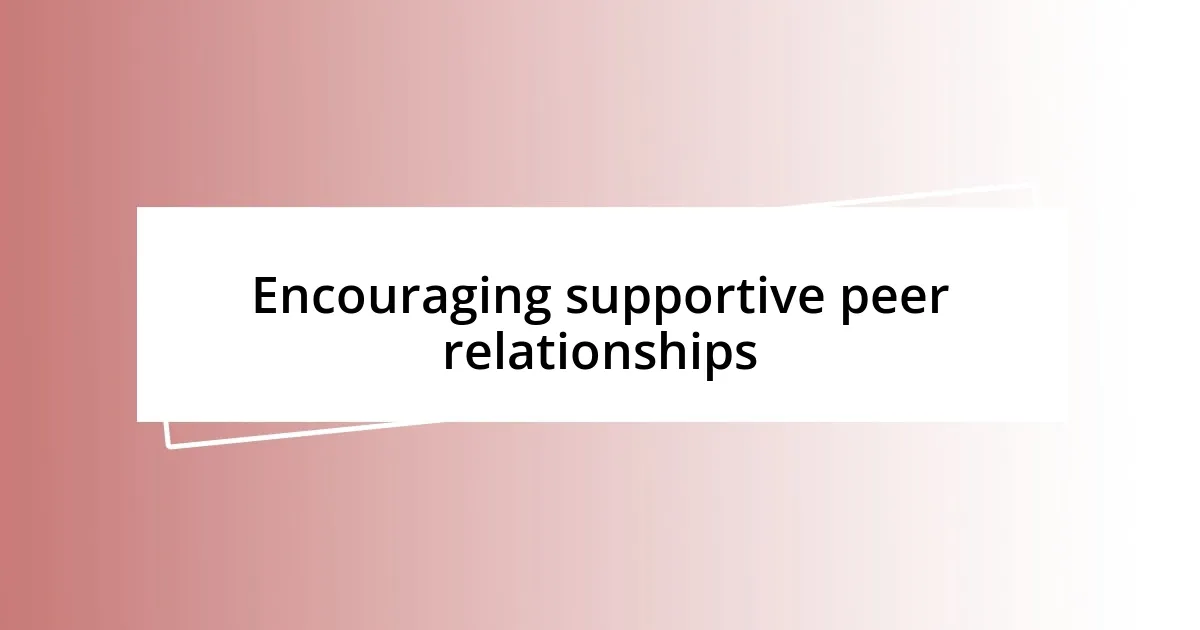
Encouraging supportive peer relationships
Fostering supportive peer relationships is about creating an environment where everyone feels valued. For instance, I remember a time when a friend confided in me about not fitting in at school. Instead of brushing it off, I made it a point to check in with them regularly. Those little gestures showed that I genuinely cared, reinforcing our bond and encouraging them to open up even more. Doesn’t it feel good to be that safe space for someone?
Sometimes, I reflect on how asking questions can deepen connections. Recently, during a casual hangout, I noticed a friend was unusually quiet. Instead of pretending everything was fine, I simply asked, “Is everything okay?” This small act of inquiry made them feel seen and allowed them to share their struggle. I believe that these moments of vulnerability in friendships can transform our relationships into a reliable support system. Have you ever considered how a well-placed question can strengthen your bond with someone?
Ultimately, celebrating each other’s successes contributes significantly to a supportive atmosphere. I still cherish the day my colleague got a promotion and I made a point to celebrate with them—complete with a small gift and a heartfelt note! It was a joy-filled moment that enriched our relationship. Doesn’t recognizing each other’s wins make the journey together all the more rewarding? Encouraging such positivity creates a collective sense of encouragement, making it easier for everyone to navigate challenges together.
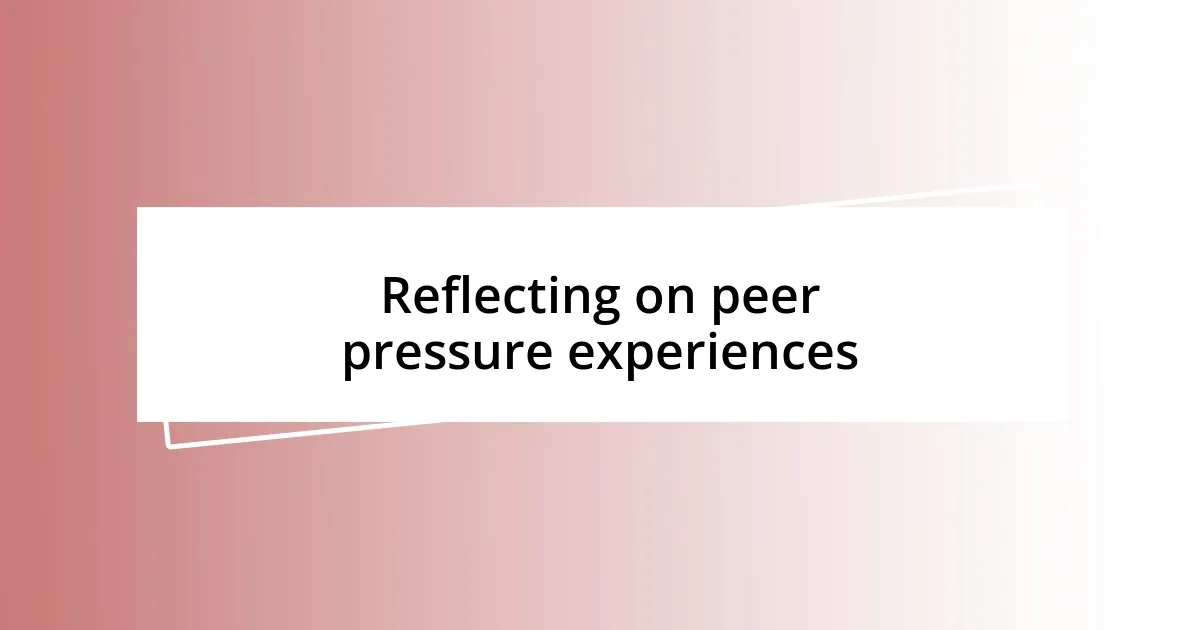
Reflecting on peer pressure experiences
Reflecting on my own experiences with peer pressure always brings me back to high school moments that shaped who I am today. I vividly recall being at lunch when a group of friends started talking about skipping class. I felt a mix of excitement and fear, thinking about the potential thrill of being rebellious. Yet, I also felt that nagging voice inside, reminding me of my goals. Have you ever been caught between wanting to fit in and staying true to yourself? In that moment, I chose to speak up, suggesting we simply enjoy our lunch and talk about our weekend plans instead. It was a small step, but it reminded me of the power each of us has in those tricky situations.
Another experience that stands out is when I found myself at a party where drinking was in full swing. I remember feeling tempted but also aware that it wasn’t something I really wanted to do. I took a moment to step outside, reflect, and remember my values. It’s funny, but that stroll gave me clarity. So, I went back in and told my friends I was opting for soda instead of beer. What struck me then was the relief I felt—it reinforced my belief that it’s okay to stand out. Have you had those moments where you realize staying true to yourself is the ultimate form of courage?
Lastly, I like to think about the times when I’ve been on the other side of peer pressure, when friends came to me unsure about their choices. There was a time when one of my friends was contemplating cheating on a test because others were. Sharing my concerns about the long-term impact of such a decision led to an open discussion. It turned out we both felt overwhelmed and needed support; we ended up forming a study group instead. Isn’t it amazing how these conversations can become opportunities for connection rather than conflict? Reflecting on these experiences not only helps me understand how to handle peer pressure, but also deepens my empathy for others going through similar challenges.
